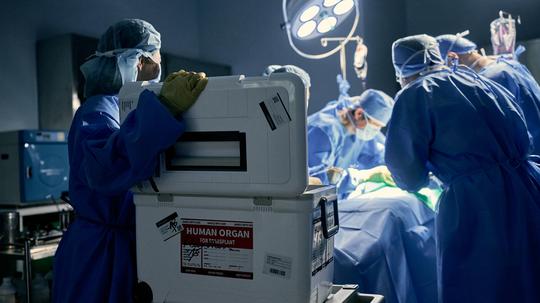
More than 100,000 people are waiting for lifesaving organ transplants in the United States. A new name is added to the list every nine minutes.
The demand for organ transplants far outpaces the supply, data from the federal Organ Procurement and Transplantation Network shows. In the local Pittsburgh area, two people die every day while on the waiting list.
Allegheny Health Network (AHN) is one of the Pittsburgh-area organizations working to bridge this gap. AHN ranks among the top health care organizations for generating organ donor registrations, according to the National Donate Life Registry.
Throughout April, AHN will participate in National Donate Life Month to raise awareness about organ donation and encourage people to register as organ, eye and tissue donors. Last year, more than 1,100 people registered to be organ donors as part of AHN’s campaign. This year, the organization hopes to top that.
"Without organ donors, transplants wouldn't exist, and many sick patients wouldn't receive these lifesaving operations," said Dr. Jennifer Carpenter, a transplant surgeon with AHN. “One of the big challenges in this field is there aren’t enough organs to go around.”
In addition to her work at AHN, Carpenter has another, more personal connection to organ donation. Her younger sister experienced kidney failure as a child and has since undergone two transplants, one with a donation from her father and one from her aunt.
Carpenter recently sat down with the Pittsburgh Inno to talk about recent transplant innovations at AHN’s Surgery Institute. The interview has been edited and condensed for clarity.
Allegheny Health Network performed its first living donor liver transplant last year. What impact does this program have on patients?
Dr. Jennifer Carpenter: Having a living donor is the only way some patients are going to get the liver transplant they need. The waiting time for an organ can be very long, particularly for people who have mild to moderate liver disease, and, unfortunately, some people don’t survive to transplant.
We are now one of several places around the country doing living donor liver transplants, and we’ve had excellent results so far.
What other innovations have you seen in living donor transplants?
Dr. Carpenter: Many advancements have been made since the inception of living donor operations. Kidney donation, for example, traditionally required an extensive open surgery to remove the organ. That has since transitioned into minimally invasive operations at almost every transplant center in the country.
Allegheny Health is one of a limited number of facilities in the country that uses the Da Vinci surgical robot to perform donor nephrectomies. Robotic surgery across all fields can decrease a patient’s hospital stay, reduce post-operative pain, and allow a faster return to work and life. This is a great positive advancement in the field, and we are proud to offer robotic-assisted donor nephrectomies to people interested in kidney donation.
Why are social workers such an important part of a transplant team?
Dr. Carpenter: They are the unsung heroes in transplants.
As surgeons, we have ethical responsibilities to be good stewards of the precious resources that are organs. So, we must ensure the people receiving transplants have family support, are going to be able to take care of themselves after the transplant and are psychologically fit to undergo such a major operation. Having a transplant is a medical condition that patients have to manage and be aware of for the rest of their lives. Social workers help ensure patients and families are ready for the transplant process. They help investigate potential obstacles to transplant and ensure patients are able to maintain their organ effectively.
The social workers are also important advocates for patients and especially for the live organ donor. The team ensures potential donors have access to wage reimbursement, work release, and approval for travel if needed. They work tirelessly to make the overall process as easy as possible and help to manage social support aspects after transplant.
How has Covid-19 changed the transplant landscape?
Dr. Carpenter: When the pandemic started many transplant centers in the center scaled back for a brief period of time because we didn’t know what was happening.
We still don’t have a full understanding of how Covid affects transplant patients, but we know people who are on immunosuppression medications are more susceptible to infections, including Covid.
Initially, if a live or deceased donor had a positive Covid diagnosis, we didn't use those organs because we didn't know if Covid could be transmitted via organ donation. Over time research has shown there’s little risk of transmission in abdominal solid-organ transplants.
There also were experiences where patients were called in for a transplant and were found to be Covid positive on admission. That was another dilemma: Can we transplant someone who has Covid and give them all the required immunosuppression medications? Initially, people who were Covid positive could not receive organs, but that’s also changing as our knowledge of Covid is evolving.
Everyone can become a hero. The lives of thousands of people are saved every year because someone makes the selfless choice to become an organ donor. Make a difference. Register as a donor.
Allegheny Health Network, a Highmark Health Company, is a western Pennsylvania-based integrated health care system that serves patients from across a five-state region that includes western Pennsylvania and the adjacent regions of Ohio, West Virginia, Maryland and New York.
Lauren Lawley Head is a freelance writer for The Business Journals Content Studio.
